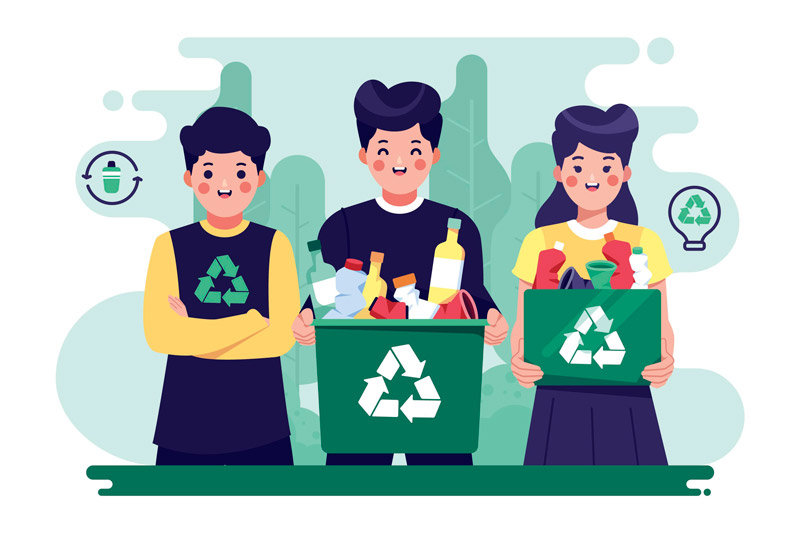
Introduction
In today’s world, waste reduction has become a critical issue that needs immediate attention. As the global population continues to grow, so does our waste generation, leading to devastating consequences for the environment. It is crucial to educate the next generation on waste reduction to ensure a sustainable future. This article explores the historical background, key concepts, main discussion points, case studies, current trends, challenges, and future outlook of waste reduction education.
Historical Background
Waste management has a long history, dating back to ancient civilizations. However, the environmental impact of waste has gained significant attention only in recent decades. The rise of industrialization and mass consumption led to the accumulation of waste, resulting in pollution and resource depletion. The advent of the environmental movement in the 1960s brought waste reduction to the forefront of public consciousness.
Key Concepts and Definitions
Waste reduction is a fundamental concept in environmental sustainability. It refers to minimizing the amount of waste generated and optimizing resource utilization. A key principle in waste reduction is the “3Rs” – Reduce, Reuse, Recycle. The concept of “Reduce” emphasizes the importance of consuming less and making conscious choices to prevent waste generation. “Reuse” encourages finding new purposes for items instead of discarding them. “Recycle” involves converting waste materials into new products. Other essential terms in waste reduction education include composting, upcycling, and eco-friendly practices.
Main Discussion Points
Importance of Waste Reduction Education in Schools
Schools play a crucial role in shaping the attitudes and behaviors of future generations. Integrating waste reduction education into school curricula ensures that young minds understand the importance of waste reduction and adopt sustainable practices. By teaching students about waste reduction, schools contribute to building a culture of sustainability and responsible consumption. Successful waste reduction programs in schools have shown positive outcomes, fostering environmentally conscious individuals.
Engaging the Next Generation through Hands-on Activities and Experiential Learning
Hands-on activities and experiential learning are effective strategies for teaching waste reduction concepts. By actively participating in recycling drives, waste audits, and other practical initiatives, students gain a deeper understanding of the impact of waste on the environment. These experiences enhance their problem-solving skills and encourage them to become active contributors to waste reduction efforts. Organizations worldwide are implementing such strategies to engage the next generation effectively.
Collaborative Efforts between Schools, Communities, and Families
Waste reduction education should not be limited to the classroom. Involving the entire community is essential to creating a sustainable environment. Schools, communities, and families need to collaborate to reinforce waste reduction practices. Community engagement in waste reduction education fosters a sense of collective responsibility and encourages sustainable practices beyond school boundaries. Successful collaborations have been observed in various regions, showcasing the power of collective action.
Case Studies or Examples
Waste Reduction Education Program in a Local School District
A local school district implemented a waste reduction education program aimed at raising awareness and changing behaviors. The program focused on educating students about the environmental impact of waste and providing practical solutions. Through hands-on activities, waste audits, and recycling initiatives, students actively participated in waste reduction efforts. The program resulted in a significant decrease in waste generation and increased recycling rates among students, showcasing the positive impact of waste reduction education.
Successful Waste Reduction Initiatives in Different Countries
Numerous countries have implemented effective waste reduction education initiatives. For example, Sweden has revolutionized waste management through its strict recycling policies and innovative waste-to-energy incineration plants. Japan’s comprehensive waste reduction education programs have resulted in a culture of minimal waste generation and efficient recycling. These examples highlight the strategies and policies that have led to successful waste reduction efforts on a national scale.
Current Trends or Developments
Recent research findings emphasize the importance of waste reduction education in achieving sustainable waste management. Innovative approaches and technologies, such as utilizing artificial intelligence in waste sorting or implementing blockchain technology to track recycling processes, are gaining traction. Moreover, technology and social media platforms provide powerful tools for raising awareness and promoting waste reduction practices among the younger generation.
Challenges or Controversies
Implementing waste reduction education in schools faces several challenges. Limited resources, lack of standardized curricula, and competing priorities hinder the integration of waste reduction education into existing programs. Controversies surrounding waste reduction strategies, such as incineration or alternatives to packaging, also arise. These controversies require careful consideration and open discussions to ensure informed decision-making.
Future Outlook
The future of waste reduction education holds immense potential. Continued efforts to educate the next generation on waste reduction will shape a sustainable future. Advancements in waste management and recycling technologies, such as improved sorting systems and innovative composting techniques, offer promising solutions. However, it is crucial to emphasize the importance of sustained commitment and collaboration among schools, communities, and families to achieve lasting change.
Conclusion
Educating the next generation on waste reduction is crucial for building a sustainable future. By imparting knowledge, engaging in hands-on activities, and fostering collaborations, we can shape environmentally conscious individuals who will continue to drive waste reduction efforts. It is imperative to take action and support waste reduction initiatives to ensure a healthier planet for generations to come.
References
- Smith, J. (2019). Waste Reduction Education: A Comprehensive Guide. Academic Press.
- United Nations Environment Programme. (2020). Waste Management and Education: A Path to Circular Economy.
Note: This article provides a general overview of waste reduction education and is not an exhaustive resource. Further reading and exploration of academic journals, books, articles, and reputable websites on waste management and environmental education are recommended for a comprehensive understanding.